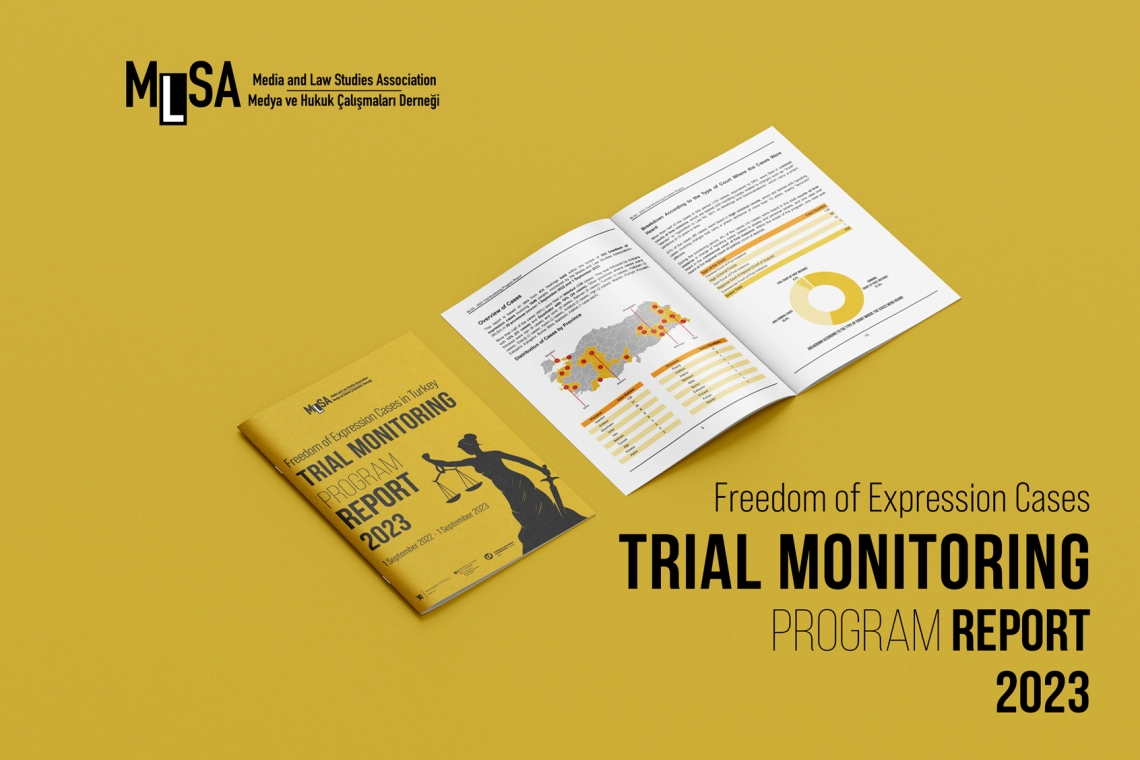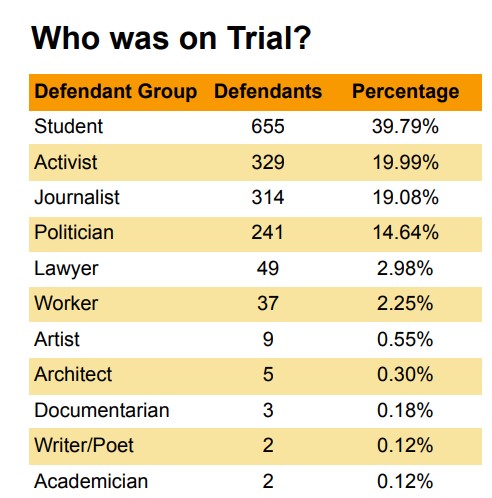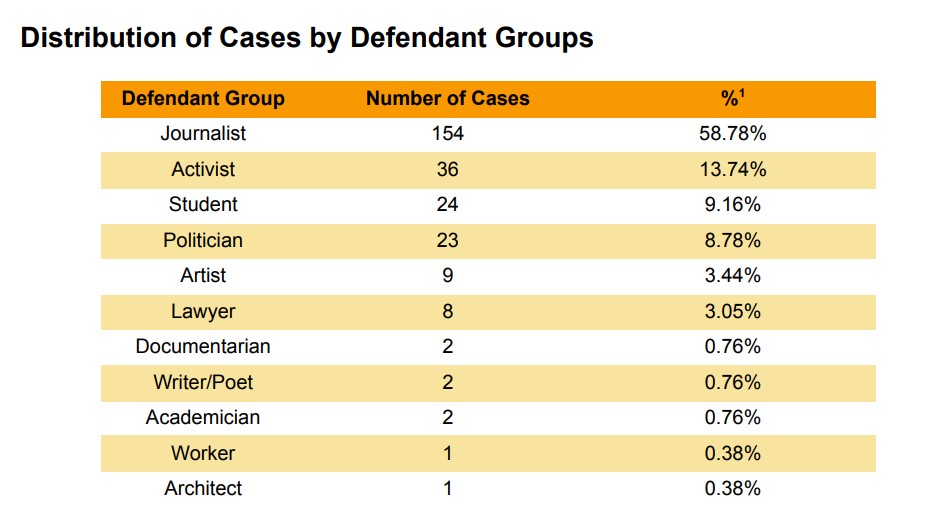According to the Media and Law Studies Association's trial monitoring report, systematic violations against the exercise of freedoms of expression, press and assembly continue to increase in Turkey. The rate of pre-trial detention increased by 150 percent this period compared to the previous period. In addition to journalists, students organizing peaceful demonstrations, women, LGBTI+ people and politicians were targeted the most. In one year, 217 years, 8 months and 20 days of imprisonment were sentenced in freedom of expression cases.
Media and Law Studies Association (MLSA), established to protect the freedoms of expression, press and information in Turkey, publishes its 2023 Trial Monitoring Report. Covering the period between September 1, 2022 and September 1, 2023, the report reveals that restrictions on freedom of expression continue to increase in Turkey.
It costs 217 years 8 months and 20 days to express oneself
In the period covered by the report, 1646 people were put on trial in 233 cases monitored by MLSA observers in 20 provinces. In 32 cases, 116 defendants were sentenced to 217 years, 8 months and 20 days in prison. Among them, 23 journalists were sentenced to 67 years, 8 months and 12 days in 17 journalism cases. In 6 cases, 12 defendants were sentenced to a judicial fine of 75,126 TL, while in 59 cases the defendants were acquitted.
Pre-trial detentions increased by 150 percent
Compared to MLSA's previous reporting period from September 2021 to July 2022, the rate of pre-trial detention increased by 150 percent. In this reporting period, 30 defendants, including 29 journalists, were tried in pre-trial detention. The dramatic increase in the number was caused by the arrest of 11 journalists in Ankara and 15 in Diyarbakır.
The most targeted group during this period were students and activists exercising their freedom of expression for their rights on the streets or at universities. It was observed that multi-defendant lawsuits were filed against students and activists.
A total of 1646 defendants were tried in the cases monitored under the program, including 655 students (37 percent of defendants), 329 activists (20 percent of defendants), 314 journalists (19 percent of defendants), and 241 politicians (14.6 percent of defendants).
Protests banned
The allegation of "violating Law No. 2911 on Meetings and Demonstrations" was brought as a charge in 20 percent of the monitored cases, the most frequent charge against those exercising their right to freedom of expression. 21.5 percent of the cases (50 cases) were filed due to peaceful demonstrations. In two cases, a total of 41 defendants were sentenced to 22 years, 11 months and 25 days in prison.
Students, women and LGBTI+ persons were the most prosecuted for expressing their opinions by exercising their right to assembly and demonstration. Students were tried in a total of 24 cases, 15 of which were filed for peaceful protests. Women were tried in 5 separate cases and LGBTI+ persons in 4 separate cases.
The report also showed that people who organized peaceful demonstrations were charged with "injury", "deprivation of liberty" or "damage to property" without any evidence.
Journalism tagged 'terrorism'
In the period covered by the report, 314 journalists were tried as defendants in a total of 154 cases, accounting for 66 percent of the cases. Of these cases, 133 (57 percent) were filed solely for journalistic reasons such as reporting and publishing news. Journalists were detained while covering peaceful demonstrations and were tried together with protesters for "violating Law No. 2911 on Meetings and Demonstrations"; some of the cases against journalists were filed with this allegation.
In 43 percent of the cases where journalists were put on trial, "terrorism" charges were the most common. Journalists were charged with "terrorist organization propaganda" in 29 cases, "membership in a terrorist organization" in 15 cases and "targeting public officials involved in the fight against terrorism" in 10 cases.
In these cases, journalists were sentenced mostly for "membership in a terrorist organization" and "making propaganda for a terrorist organization"; 28 years and 9 days in total for "membership in a terrorist organization" and 15 years, 6 months and 28 days in total for "making propaganda".
News pieces and social media posts used as evidence for terrorism
While journalists were brought to court on serious and comprehensive charges such as "terrorism", prosecutors cited their news reports, social media posts, phone conversations with fellow journalists and even with their spouses as "evidence" for these charges. Another observation of the report is that the tendency to use news reports and social media posts as "evidence" in indictments has become widespread.
Of the 90 different pieces of evidence presented in the cases against journalists for "membership in a terrorist organization", 20 (22 percent) were news articles and 11 (12 percent) were social media posts.
Censorship Law is the new tool of repression
During the period covered by this report, the "Disinformation Law", which was passed in October 2022 with the votes of AKP and MHP, was used as a new tool of pressure on freedom of expression and thought. At least 26 journalists were investigated, 6 journalists were detained and at least 4 journalists were arrested under this legislation.
The first journalist to be investigated, arrested and sentenced under the law was Sinan Aygül, a journalist for whom MLSA acted as defense counsel. Aygül was sentenced to 10 months in prison. MLSA filed the first individual application on this law regarding his detention to the Constitutional Court. The Constitutional Court rejected the application for the annulment of the law.
Constitutional Court decisions and ECtHR rulings are not respected
During the monitoring period, the events following the Constitutional Court’s Can Atalay ruling, once again revealed that "judicial independence" is a burning problem in Turkey. The lower court's failure to comply with the Constitutional Court's decision on Can Atalay's application led to an unprecedented constitutional crisis in Turkey's legal history.
On the other hand, the monitoring report also revealed that in different cases the courts failed to comply with the rulings of the Constitutional Court and the European Court of Human Rights (ECtHR).






